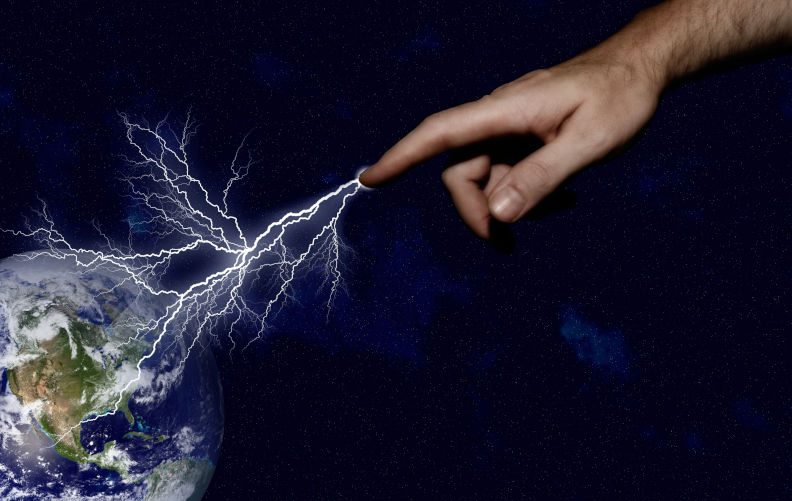The catastrophic conflict between Israel and the Palestinians (the present “ceasefire” notwithstanding) has done nothing to relieve the centuries-old contradictions that exist between and within our three monotheistic religions: Judaism, Islam and Christianity.
Mysteriously, God’s role in these ongoing horrors is seldom seriously discussed by our political leaders, the media or even religious leaders. In this article I want simply to reflect on my layman’s conclusions regarding God’s intentions, arrived at after the nearly 90 years of personal and wide-ranging professional experiences I’ve been privileged to be a part of. Nevertheless, I believe my views rest in the hearts and minds of many others, be they people of faith or not.
I do not regard myself as either atheist or agnostic. I have come to rely on the extensive and growing body of science that strongly points to the absence of a divine creator even though, as yet, science doesn’t have all the answers. But, as noted God-doubter, Richard Dawkins, said, rather archly, “If there is a God, science has a lot to answer for”.
I envy the devout their surety that eternal life awaits us (personally, l’d be delighted if it did, providing I qualified). Those who live their belief in compassion, tolerance and love for others, including the distressed (remember the Good Samaritan), have my total respect. It’s those who consider their faith entitles them to dictate the lives of others and, worse, arrogantly enforce their will by violence, to whom I strongly object. Most despicable are those who exercise power by using religion as sanctimonious justification for their murderous actions. I have a strong suspicion that it is the latter (on both sides) that has led to most of the life-destroying conflicts between Israel and Palestinians.
All this raises the question of what God thinks – if he exists, that is. If he does exist, where was he during all the murderous events carried out over centuries past? And why is he indiscriminate over who is killed, maimed or dispossessed? Men, women, children, the devout and the unbelievers – all fall victim to God’s apparent indifference. Prayers for lasting peace seem to go unheard, with the usual human reaction being a helpless, “It must be God’s will”. Now we hear Donald Trump claiming it was God’s will that he was saved from the assassin’s bullet. That is definitely worth thinking about.
In my early childhood, attending a small weatherboard Methodist church in rural Queensland, our Sunday school lessons often centred on God’s all-seeing and all-knowing power. “God knows every blade of grass”, was the lesson delivered to us kiddies and re-iterated during the pastor’s sermon to our parents. Furthermore, it was a message that was to be taken literally, along with “God loves us all”.
I had no idea then that there were variations of Christian belief with different qualifications attached to each “brand”. As I grew up, it was drummed into us that our denomination was the only genuine one while all others were doomed to suffer eternal damnation for their “sins”. At the same time, Catholics were taught that theirs is “the one true faith” – as they still are.
I’m sure all Protestants remember the schoolyard doggerel about “Catholic dogs”, although I eventually found out that Catholics are equally familiar with the same ditty, only it’s about “Protestant dogs”.
And that’s where the seemingly harmless becomes discrimination through indoctrination: in the schoolyard (but even earlier in the home) and spreads outward to become an intergenerational imperative. And not only between Catholics and Protestants, but across all faiths. Thus, at best, suspicion and, too often, deadly violence prevails between Jews, Muslims and Christians.
Why then don’t we start talking seriously about the many contradictions inherent in the teachings of all faiths: that God loves us all, is all-powerful and all-knowing, yet he allows catastrophic acts to be committed against each other by the supposedly advanced creatures he created? Further, why does he allow them to be committed in his name? And even more puzzling; why did God plan it this way which, as the divine Creator, he must surely have done?
Over the centuries, excuses for God’s behaviour have been endless, the most banal being “God moves in mysterious ways”. There are countless words purporting to be straight from God and covering all sorts of eventualities. However, the inconsistences of different authors writing different versions enable the leaders of the many different sects to set their own interpretations that maintain their power and their following. Multiple translations have added more variations, all open to interpretation to suit different rationales at different times. Surely God has the power and the desire to ensure his “word” is recorded and presented exactly as he intended it?
Of course, there’s also the fly in God’s ointment; religion’s arch-villain, the devil. He’s supposedly the instigator of all evil who, at will, takes over the minds of the weak. The obvious question then is: who is the more powerful, God or Satan? Surely God created Satan along with everyone and everything else and, presumably, deliberately endowed him with all the evil for which he’s blamed. If “God has a plan for everyone” as I was taught at my Methodist Sunday School, mustn’t it include Satan? Yet, we keep rationalising abhorrent behaviour by claiming that God gave us (and Satan presumably) free will. However, wouldn’t God the Creator have pre-knowledge of the direction we (and Satan) would all take – or even have planned it?
To bring us back to the present, the Hebrew texts are confusing over “God’s promise” to Israel of the land they occupy. The modern Israeli interpretation is that the “gift” was permanent – but, historically, there is some debate over the conditions that were attached in some “instructions”. What is really disturbing is that secular Western governments decided after WWII to accept the unprovable “word of God” as a rationale (among other, more pragmatic political issues) to enable an official state of Israel. Then, despite affirming Palestinians’ right to also live in the region where they too had settled for several thousand years, we failed to properly legitimise them along equal lines with Israel. Again, part of “God’s universal plan”? Yet, that’s from whence the trouble has festered and why it continues to this day.
There is a multitude of other questions to be asked about faith, but the big question for today is why hasn’t the all-powerful God of Judaism, Islam and Christianity finally proved his loving existence by stopping all violence across the globe and saving untold lives and property? Or has he a different plan in mind for us all – if he exists? And if he doesn’t exist, what then?
Eric Hunter’s 20-year ABC career spanned all states and the ACT while occupying a range of responsibilities, primarily in radio and TV journalism and state and national program management. He undertook overseas assignments for the ABC and in 1967 participated as a presenter in two historic live international TV firsts, ”Expo ‘67” and the BBC’s “Our World”. In 1976 he was awarded the UK’s prestigious Imperial Relations Trust Scholarship, enabling a six months study of broadcasting, politics and governance in Britain. Post-ABC, he spent 25 years in communications management and as a journalism lecturer at the University of Canberra.

